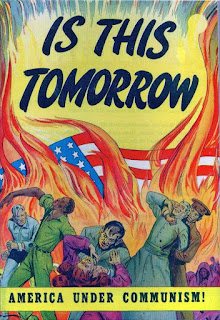Logical Fallacy - The Crucible
Mirë dita!
Logical fallacies are common errors in reasoning that will undermine the logic of an argument. Fallacies can be either illegitimate arguments or irrelevant points and are often identified because they lack evidence that supports their claim. They're being used by politicians, in the news, and in other media have the potential to lead to a human rights violation similar to The Salem witch hunts, McCarthyism.
There are multiple techniques that are familiar when infusing logical fallacies into certain statements. For instance, Strawman is the misrepresentation of an argument to make it easier to attack. This is used in MSNBC's Democratic Presidential Candidate's Forum, Bernie Sanders gave this quote: "Very strong gun control advocates may not get everything they want. And people who think they should have a missile launcher in their backyard as a Constitutional right may not have that." While providing vivid imagery, it is a wild exaggeration of what truly is going on in the realm of gun control advocacy. Not many, if at all, citizens of the United States wish to own a missile launcher in the backyard of their home. If they did, certainly something would be done about it (one would hope).
 In the Crucible, this play by Arthur Miller is wildly famous for its usage of illogical methods such as logical fallacies, propaganda, and bias. These techniques direct the course of the story, in Act 3 Ad hominem attacks on multiple occasions. This fallacy is an attack on the character of a person rather than his or her opinions or arguments. For example, "Green Peace's strategies aren't effective because they are all dirty, lazy hippies." In this example, the author doesn't even name particular strategies Green Peace has suggested, much less evaluate those strategies on their merits. Instead, the author attacks the characters of the individuals in the group.
In the Crucible, this play by Arthur Miller is wildly famous for its usage of illogical methods such as logical fallacies, propaganda, and bias. These techniques direct the course of the story, in Act 3 Ad hominem attacks on multiple occasions. This fallacy is an attack on the character of a person rather than his or her opinions or arguments. For example, "Green Peace's strategies aren't effective because they are all dirty, lazy hippies." In this example, the author doesn't even name particular strategies Green Peace has suggested, much less evaluate those strategies on their merits. Instead, the author attacks the characters of the individuals in the group.
In the play, instead of attacking the evidence, the court decides to attack the character of people. One such example is John Proctor. When Danforth asks Proctor whether he is “a Gospel Christian”, Proctor replies that he is. However, Parris, in an effort to smear Proctor’s reputation, claims that Proctor skips church often, even plowing fields on the Sabbath. When the court takes Proctor’s behavior as evidence, Hale rightfully recognizes that this is irrelevant to the discussion at hand; however, Danforth silences him.
There was also how those who are innocent do not fear the court, or, in its original formulation, “No uncorrupted man may fear this court”. This comes from taking the inverse of the statement “All those who are guilty fear the court.” The problem with such a statement is it is only an inference and can’t always be true. One way to make it true is to take the contrapositive, i.e. “Those who do not fear the court are innocent.”
In the first act, as well as throughout the play there's the application of rhetoric. In the logical perspective of logos, Proctor tries to achieve understanding amongst parties in the discussion by pointing out simple facts. He does so particularly effectively with Rev. Parris in Act I when Putnam is getting pushy. Putnam tries to throw his land weight around to get his way and Proctor reminds him:
works
- Morris, Hannah. “Fallacies In Politics.” The Odyssey Online, 26 July 2016
- Hiegel, Katie . “The Most Common Logical Fallacies In Politics.” The Odyssey Online, 12 Dec.
2016
- Wang, David. “What are some logical fallacies in act 3 of "The Crucible"?” What are some logical
fallacies in act 3 of 'The Crucible'? - Quora, 8AD.
Logical fallacies are common errors in reasoning that will undermine the logic of an argument. Fallacies can be either illegitimate arguments or irrelevant points and are often identified because they lack evidence that supports their claim. They're being used by politicians, in the news, and in other media have the potential to lead to a human rights violation similar to The Salem witch hunts, McCarthyism.
There are multiple techniques that are familiar when infusing logical fallacies into certain statements. For instance, Strawman is the misrepresentation of an argument to make it easier to attack. This is used in MSNBC's Democratic Presidential Candidate's Forum, Bernie Sanders gave this quote: "Very strong gun control advocates may not get everything they want. And people who think they should have a missile launcher in their backyard as a Constitutional right may not have that." While providing vivid imagery, it is a wild exaggeration of what truly is going on in the realm of gun control advocacy. Not many, if at all, citizens of the United States wish to own a missile launcher in the backyard of their home. If they did, certainly something would be done about it (one would hope).
As well as Appeal to Authority, this is because this connects to the idea of an authority figure thinks something, it, therefore, must be true. In doing research, it seems that four out of the five living presidents have come forward and stated that they will not support Donald Trump. Restating, George Bush Senior, Bill Clinton, George W. Bush, and Barack Obama are/were against Donald Trump for president of the United States. In this instance, when looking at the Appeal to Authority fallacy, it would make sense from the view of the people, because four of our five living presidents believe something to be true (i.e. Donald Trump would not make a good fit for president), that this must, in fact, be true.
 In the Crucible, this play by Arthur Miller is wildly famous for its usage of illogical methods such as logical fallacies, propaganda, and bias. These techniques direct the course of the story, in Act 3 Ad hominem attacks on multiple occasions. This fallacy is an attack on the character of a person rather than his or her opinions or arguments. For example, "Green Peace's strategies aren't effective because they are all dirty, lazy hippies." In this example, the author doesn't even name particular strategies Green Peace has suggested, much less evaluate those strategies on their merits. Instead, the author attacks the characters of the individuals in the group.
In the Crucible, this play by Arthur Miller is wildly famous for its usage of illogical methods such as logical fallacies, propaganda, and bias. These techniques direct the course of the story, in Act 3 Ad hominem attacks on multiple occasions. This fallacy is an attack on the character of a person rather than his or her opinions or arguments. For example, "Green Peace's strategies aren't effective because they are all dirty, lazy hippies." In this example, the author doesn't even name particular strategies Green Peace has suggested, much less evaluate those strategies on their merits. Instead, the author attacks the characters of the individuals in the group.In the play, instead of attacking the evidence, the court decides to attack the character of people. One such example is John Proctor. When Danforth asks Proctor whether he is “a Gospel Christian”, Proctor replies that he is. However, Parris, in an effort to smear Proctor’s reputation, claims that Proctor skips church often, even plowing fields on the Sabbath. When the court takes Proctor’s behavior as evidence, Hale rightfully recognizes that this is irrelevant to the discussion at hand; however, Danforth silences him.
There was also how those who are innocent do not fear the court, or, in its original formulation, “No uncorrupted man may fear this court”. This comes from taking the inverse of the statement “All those who are guilty fear the court.” The problem with such a statement is it is only an inference and can’t always be true. One way to make it true is to take the contrapositive, i.e. “Those who do not fear the court are innocent.”
In the first act, as well as throughout the play there's the application of rhetoric. In the logical perspective of logos, Proctor tries to achieve understanding amongst parties in the discussion by pointing out simple facts. He does so particularly effectively with Rev. Parris in Act I when Putnam is getting pushy. Putnam tries to throw his land weight around to get his way and Proctor reminds him:
You cannot command Mr. Parris. We vote by name in this society, not by acreage.
Further, in the text, Putnam challenges Proctor for not being at church, again Proctor comes in with a fact, a truth:
There are many others who stay away from church these days because [he] hardly ever mentions God anymore.
Ethos (an awareness of the ethical and moral necessities within a person) is demonstrated through Proctor's efforts to rebirth his marriage. He could have Abigail. She continues to pursue him after their affair ended months ago. Though despite her advances in Act I he refuses to be tempted again. When she mentions Elizabeth, his moral indignation rises and he defends his woman.
These exemplify how literature, history, and even modern day can connect with the use of logical fallacies. They're errors in these arguments that can occur, though people have proven time and time again to possess ignorance when this is brought to them. As people, we must pay attention to what our leaders say, as if speaks to their intentions and how they wish to conduct as luminaries. This focuses on how there must be a push towards paying attention, the meticulous effort of noticing what one says and understanding any double-meanings. As people during the Red Scare (1940-50) abandoned reason as they did in the Salem Witch Trials, which created a world of terror and distrust. In order to prevent these occurrences, society must head Miller's message concerning the events conducted in the Crucible and how he was able to relate that to his era. As I believe many today can connect it to our present day as well.
All Love, Aya ♥
works
- Morris, Hannah. “Fallacies In Politics.” The Odyssey Online, 26 July 2016
- Hiegel, Katie . “The Most Common Logical Fallacies In Politics.” The Odyssey Online, 12 Dec.
2016
- Wang, David. “What are some logical fallacies in act 3 of "The Crucible"?” What are some logical
fallacies in act 3 of 'The Crucible'? - Quora, 8AD.

Comments
Post a Comment